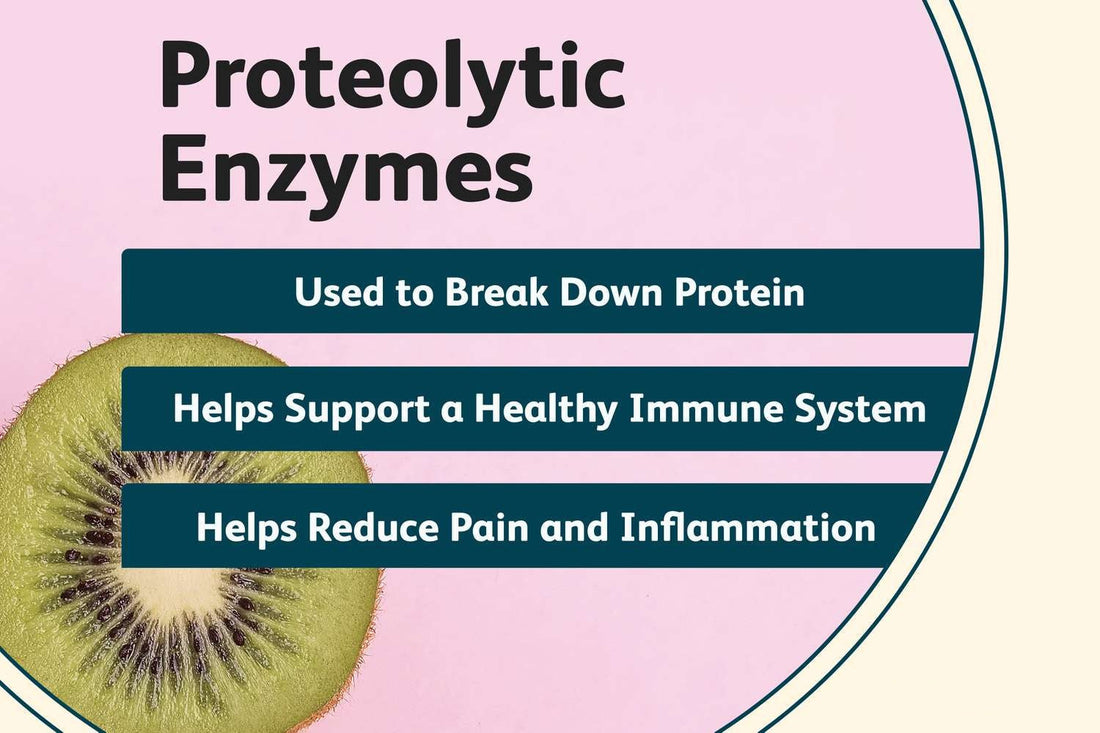What Are Proteolytic Enzymes?
Proteolytic enzymes (proteases) are enzymes that break down proteins into peptides and amino acids. In the body, they serve roles in digestion, cellular turnover, and cleanup of damaged proteins. In supplemental form, when delivered systemically (i.e. absorbed into the bloodstream), they may support inflammation resolution, recovery from physical stress, and improved circulation.
Common proteolytic enzymes include:
-
Bromelain
-
Papain
-
Trypsin / Chymotrypsin
-
Serrapeptase
-
Other protease blends
These enzymes can digest excess protein debris, fibrin, or molecular fragments associated with injury or inflammation — helping the body clear out what may “slow down” healing.
Why Proteolytic Enzyme Delivery & Survivability Matters
Proteolytic enzymes are sensitive proteins, meaning they can be degraded by stomach acid if taken without protection. That’s why formulation is critical.
Enteric Coating: Protecting Enzyme Viability
An enteric coating is a pH-sensitive layer around the tablet or capsule that resists dissolution in the stomach (acidic environment) and breaks open in the small intestine (more neutral pH). This ensures:
-
Enzymes survive stomach acid
-
They become active further downstream, where absorption or systemic activity is more feasible
-
More consistent and reliable effect per dose
Without proper protection, a large portion of enzyme activity may be lost before it can act systemically.
How Systemic Enzymes Support Inflammation & Recovery
When proteolytic enzymes reach systemic circulation, here’s how they may help:
Debris Clearance & “Cleanup”
After tissue stress or injury, damaged proteins, micro-fibrin deposits, and byproducts accumulate. Proteases can help break down these molecules so the body can remove them more efficiently.
Modulating the Inflammatory Cascade
Some proteolytic enzymes interact with inflammatory mediators (e.g. bradykinin, complement fragments) and may help shift the balance toward resolution rather than chronic inflammation. (For example, proteolytic enzymes have been discussed as helping neutralize biochemicals of inflammation in physical therapy literature.)
Supporting Microcirculation & Fluid Flow
By digesting microfibrin or unwanted protein conglomerates in tissues, proteases may help reduce local “stagnation,” supporting better blood flow, nutrient delivery, and lymphatic drainage.
Synergy with Recovery & Repair
Clearing debris and inflammation more effectively allows the repair and rebuilding processes in muscle, connective tissue, and joints to proceed with less interference.
Ultra Proteo-Zimes™ Enteric-Coated: What Makes It a Strong Choice?
Here’s how Ultra Proteo-Zimes™ (similar to Holly Hill Ultra Proteo‑Zimes™ Enteric‑Coated) aligns with what you want in a systemic proteolytic enzyme formula:
-
Enteric coating protects the enzyme blend until it reaches the small intestine
-
High potency / concentrated formulation aims to deliver systemic effect rather than only digestive support
-
Clean ingredient profile (no unnecessary fillers or artificial additives)
-
Designed specifically for inflammation, circulation, and recovery support
You’ll want to check your label or supplier information for exact enzyme types and units (e.g. “SPU, GDU, etc.”) to highlight potency in your content.
Usage Tips & Best Practices for Ultra Proteo-Zimes
-
Take on an empty stomach, ideally between meals, so enzymes are less likely to be consumed digestively.
-
Start with a moderate dose to assess tolerance before increasing.
-
Stay consistent — systemic effects tend to build over weeks rather than days.
-
Combine with nutrition, rest, and movement for best outcomes.
-
Avoid taking with high-protein meals if your goal is systemic action (digestive needs may compete).
Safety, Contraindications & Considerations for Systemic Enzyme Supplements
Proteolytic enzyme supplements are generally well tolerated, but some precautions should be considered:
-
Blood thinning / anticoagulants: Since proteases may influence clotting or fibrin breakdown, use caution with warfarin, heparin, or other anticoagulants.
-
Bleeding risk / surgery: Discontinue prior to surgery or healing periods per medical advice.
-
Allergies / sensitivities: Some may react to pineapple, papaya, or other enzyme sources.
-
Digestive discomfort: In high doses, some may experience mild GI symptoms.
-
Interactions: Check for interactions with medications, especially digestive, immune, or inflammatory agents.
Always consult a healthcare provider before beginning enzyme therapy, especially if on medications or with underlying health conditions.
Summary Proteolytic Enzyme Supplements for Inflammation & Recovery
Proteolytic enzymes, when properly delivered (e.g. via enteric coating), offer a promising approach to supporting systemic inflammation balance, tissue recovery, and circulation. They complement, not replace, good nutrition, movement, rest, and holistic health.
If you're looking for a quality systemic enzyme formula, Ultra Proteo-Zimes™ Enteric-Coated is worth considering. Be sure to verify potency, enzyme composition, and delivery technology.

